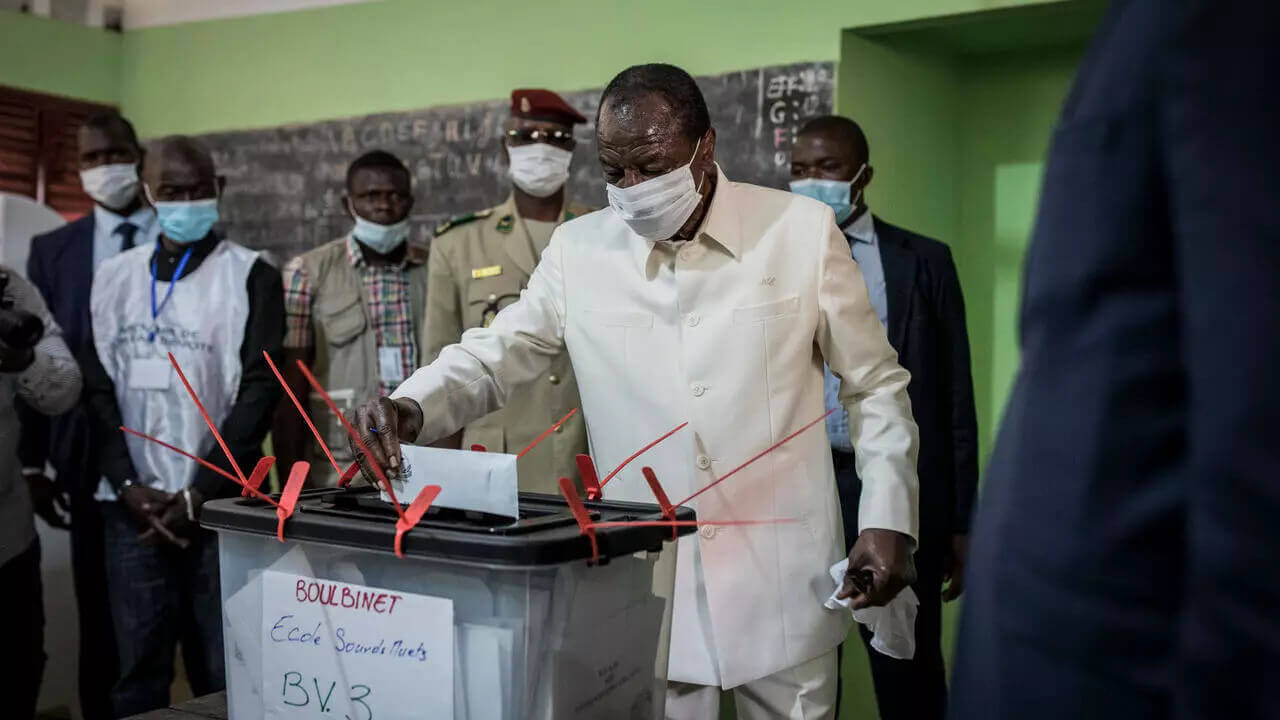Despite opposition candidate Cellou Dalein Diallo proclaiming victory, Guinean President Alpha Condé has now been declared the victor of the country’s recently concluded election by electoral authorities. Condé reportedly secured 59.49% of the vote, compared to Diallo’s 33.5%, with voter turnout estimated at 80%.
Diallo, his supporters, and critics of the government allege that the vote was rigged in favor of Condé. It has been reported that at least 17 people have been killed since the election was concluded, with some saying that the true number is over 30.
Protests have erupted in various parts of the country, garnering international attention. The International Criminal Court’s Chief Prosecutor, Fatou Bensouda released a statement saying, “Disputes between candidates should be resolved by the competent authorities and in full observance of the law. My office is following developments in Guinea very closely.”
She expressed her “great concern” at “recent reports of violence between supporters of the different candidates, and violent clashes between demonstrators and security forces,” calling them “deplorable” and asserting that they “perpetuate cycles of violence”.
Bensouda warned, “I wish to repeat this important reminder: anyone who commits, orders, incites, encourages or contributes, in any other way, to the commission of Rome Statute crimes, is liable to prosecution either by Guinean courts or by the ICC.”
Last week, Diallo claimed victory against Condé, with his supporters taking to the streets to chant, “Cellou, President!” Diallo addressed supporters by saying, “Despite the serious anomalies that marred the smooth running of the … election and in view of the results that came out of the ballot boxes, I am victorious in this election in the first round.”
The country’s electoral body, however, declared his comments “void”, saying that the Independent National Electoral Commission is “the only institution empowered to proclaim provisional results”, adding that these have not been released “for the time being”. As many suspected, the electoral authorities have since declared Condé as the winner.
The Independent National Electoral Commission’s (CENI) chief, Kabinet Cissé, announced, “The candidate Alpha Condé has been elected president of the republic in the first round of voting.”
This decision was celebrated by Condé’s supporters and his party, the Rally of the Guinean People (RPG, Arc-En-Ciel). The spokesperson for the party said, “We must thank the Guinean people, who have maintained the country’s democratic foundations by casting their ballots.” He added, “It comes as no surprise to us that the people have once again placed their trust in Professor Condé. We regret Cellou Dalein Diallo’s attitude and are working to ensure that nothing gets in the way of our burgeoning democracy.”
Condé’s re-election has been backed by observers from the African Union (AU) and the Economic Community of West African States (ECOWAS), who put their weight behind the electoral process in the country. They said that the elections were “held in a transparent, secure, calm, and peaceful environment”.
The opposition, however, alleges vote-rigging. Diallo’s party, the Union of Democratic Forces of Guinea (UFDG), is preparing to file a complaint with the nation’s constitutional court. The UFDG’s secretary-general, Aliou Condé, remarked, “We can’t recognise these election results. We have documents from the polling stations that tell a different story. We’re going to prepare our complaint in accordance with Guinean law and file it with the Constitutional Court.” He went on to say, “We hope that justice will be served and that the court will deliver a nice surprise. We will continue to fight!”
Some of the irregularities cited by the UFDG include the fact that the CENI recorded voter turnout of close to 100% in regions dominated by the ruling RPG party, which the opposition contends is unlikely and unrealistic. At the same time, they claim to have “actual records from these areas showing that turnout didn’t exceed 50%”. Likewise, opposition alliance party Modern Guinea says that its vote count shows that Diallo secured 52% of the vote to Condé’s 39%.
In the months leading up to the election, Condé amended the constitution to allow himself to run for a third five-year term. He became the country’s first democratically elected leader in 2010, after the tumultuous dictatorships of Lassana Conté, who ruled from 1984 to 2008, and Ahmed Sékou Touré, who ruled from 1958 to 1984.
However, since entering office, it has become clear that the same economic mismanagement and corruption that plagued previous administrations are still rife under the current leadership. In fact, there are fears that, like Touré and Conté, the current president will also seek to rule the country until his death.
In July, when the government first hinted that Condé would seek a third term in office, violent protests erupted, leading to dozens of deaths at the hands of security forces. Following his supposed victory in the recently-concluded election, it appears that these brutal crackdowns on political dissidents are once again on the rise.
Guinean Electoral Authorities Declare Condé Victor, Opposition Alleges Vote-Rigging
President Alpha Condé maintained his incumbency in Guinea’s recently concluded election, prompting a furious response from the opposition and civil society.
October 27, 2020

Guinean President Alpha Condé casts his ballot in Conakry, Guinea, Oct 18, 2020 SOURCE: JOHN WESSELS / AFP
